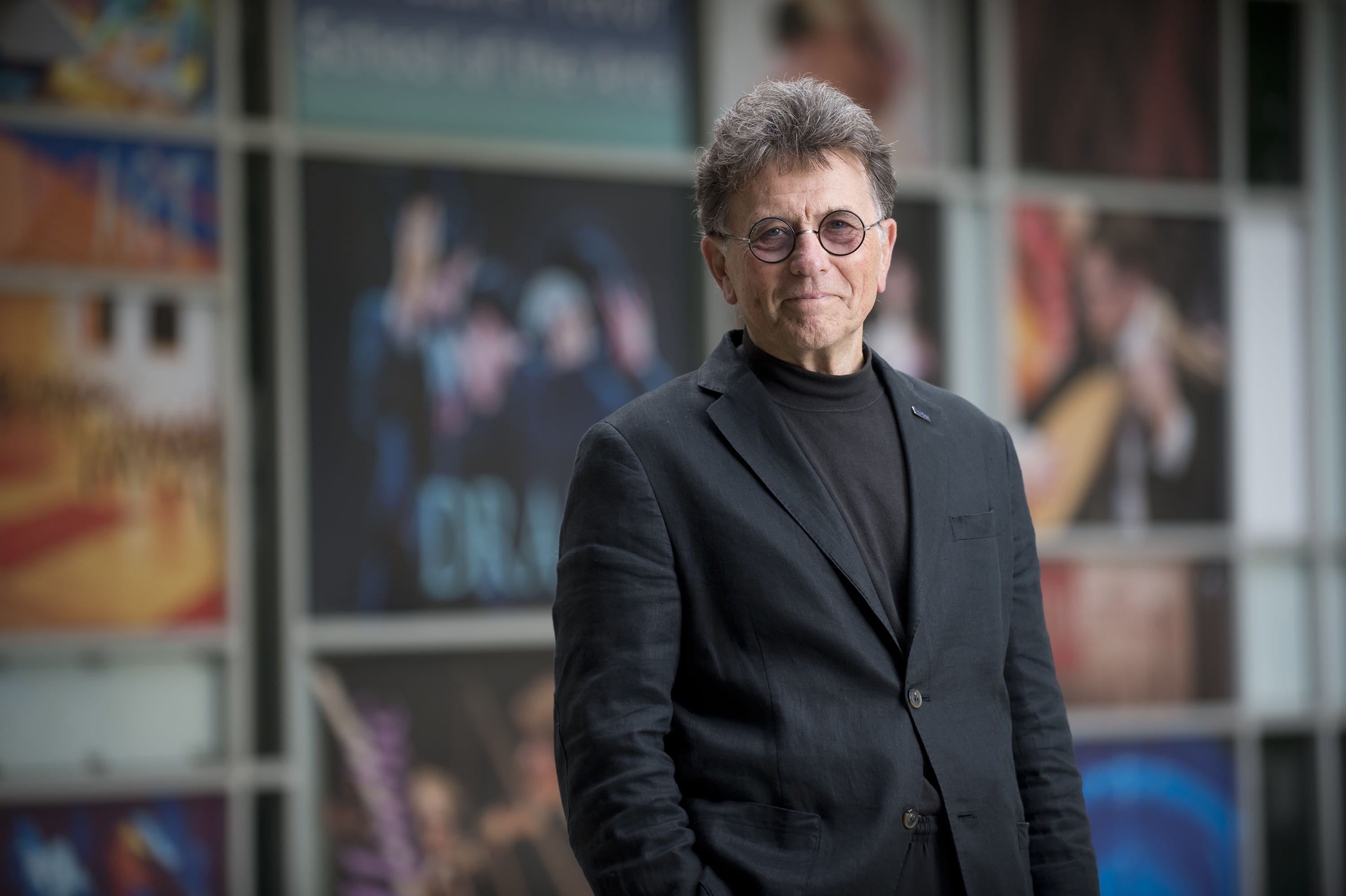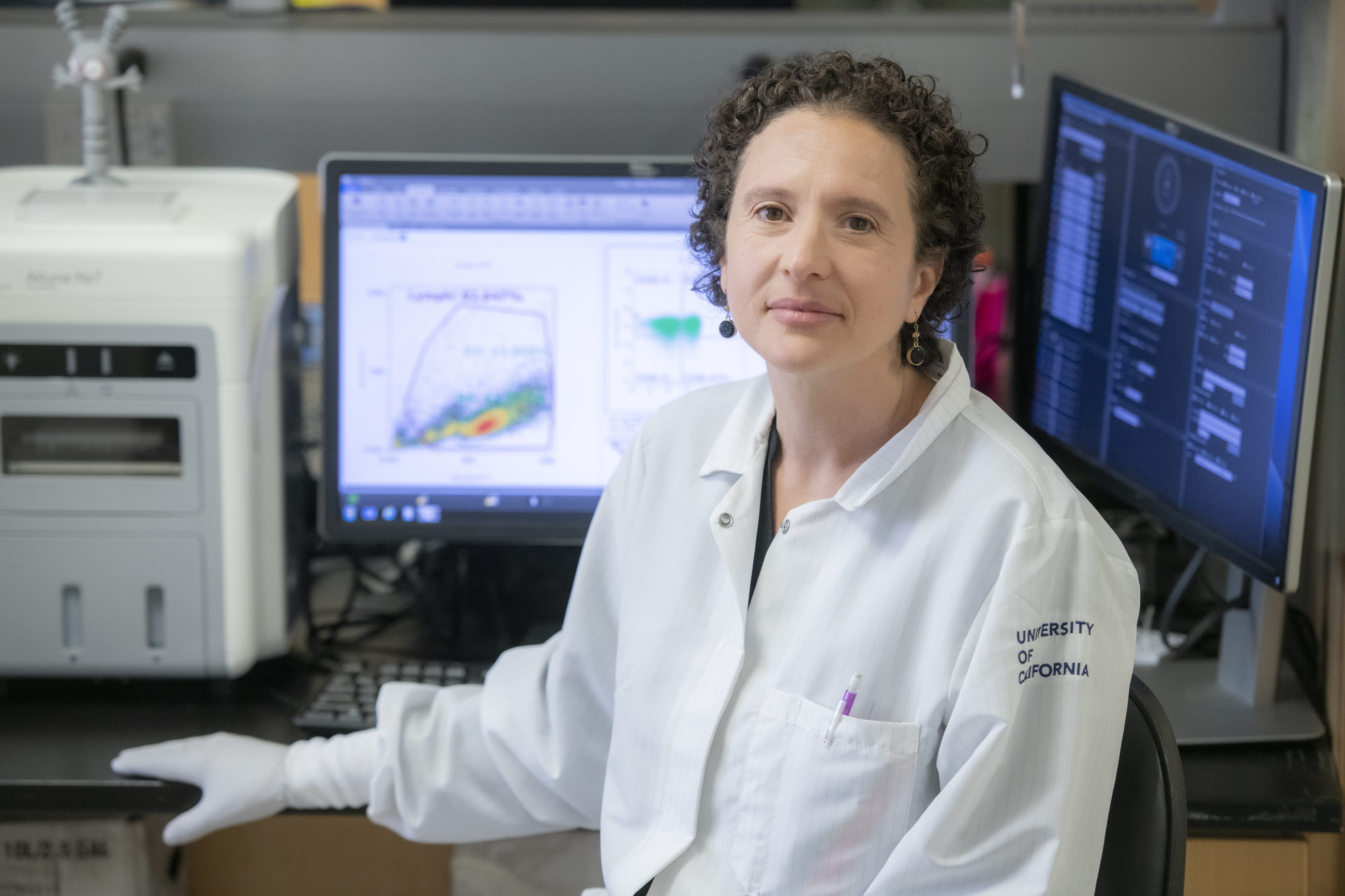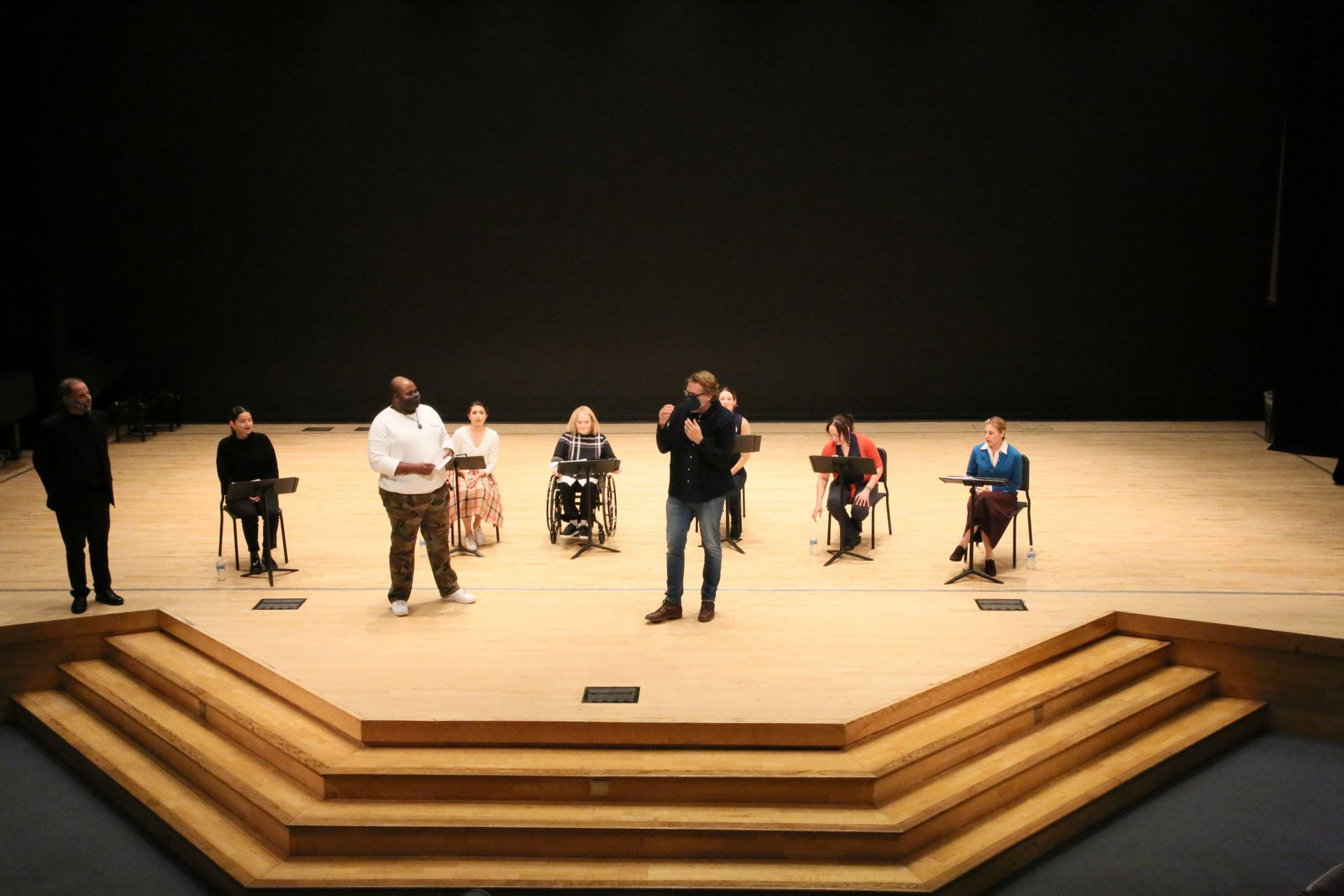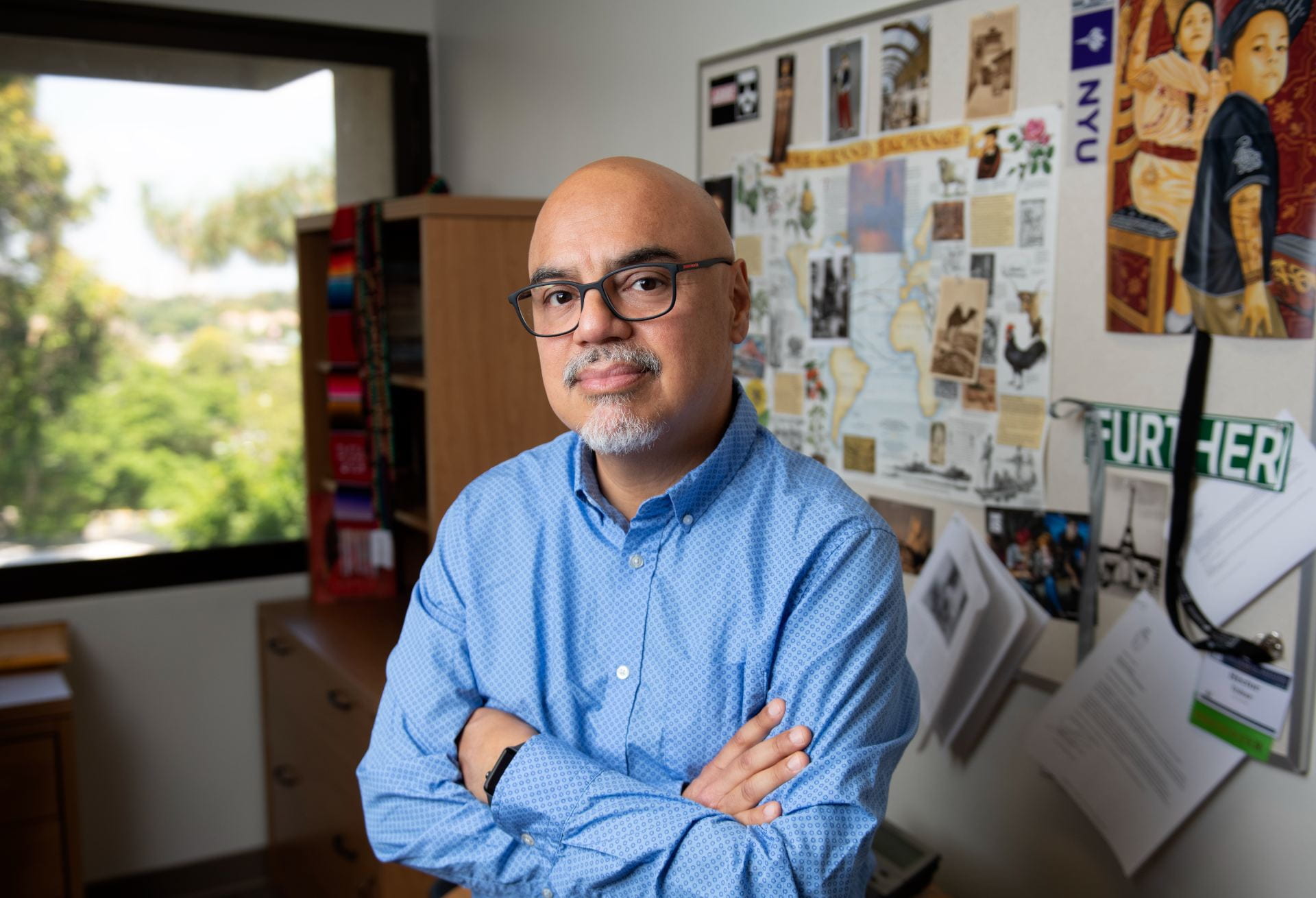UCI Podcast: The arts respond to COVID-19
Students took live shows online to spread art’s healing power during the pandemic

Few elements of society suffered as much as live music and theater productions when COVID-19 struck. At the UCI Claire Trevor School of the Arts, a whole season’s worth of scheduled productions went out the window as performers and professors adapted to an online-only reality. But while in-person performances are impossible, the need for the arts is greater than ever to provide a salve for the crisis.
In this episode of the UCI Podcast, Stephen Barker, dean of the UCI Claire Trevor School of the Arts, discusses how the school answered the pandemic, and why the arts have such power to heal.
In this episode:
Stephen Barker, dean of the UCI Claire Trevor School of the Arts
“The Jubilee and Me” – Songs I Never Got to Sing, a virtual performance put on by the UCI Claire Trevor School of the Arts
ArtsOC, Orange County’s local arts agency
Pacific Symphony, an Orange County orchestra
“Pacific Symphony working with UCI public health experts on COVID-19 plan,” a UCI press release
To get the latest episodes of the UCI Podcast delivered automatically, subscribe at:
Apple Podcasts – Google Podcasts – Stitcher – Spotify
Transcript
AARON ORLOWSKI, HOST
Live theater and music productions have been laid low by the COVID-19 pandemic. And at UCI, student performers and professors have pivoted to online productions and they’ve adopted innovative techniques to keep the arts alive during a time when their healing power is needed more than ever.
How did performers and professors at UCI respond to the pandemic? And what role do artists have to play in serving as a balm for the soul?
From the University of California, Irvine, I’m Aaron Orlowski. And you’re listening to the UCI Podcast. Before the holidays, I spoke with Stephen Barker, who is the dean of the UCI Claire Trevor School of the Arts.
Dean Barker, thank you for joining me today on the UCI Podcast.
STEPHEN BARKER
Thank you very much, Aaron, it’s a great pleasure to be here.
ORLOWSKI
So what happened to the theater, music and other art productions at the Claire Trevor School of the Arts back in the spring when the COVID-19 pandemic first hit?
BARKER
Well, it really was our version of the San Francisco earthquake and fire. I tell you, we were — we do all of our planning a year ahead, at least, the art department two years ahead. And all of that was absolutely in place until around the 10th or 15th of March. But when it hit, we essentially had a week to get off campus. And by the 17th of March, everybody in the School of the Arts was operating from home, from garages, or home studios, or at any rate off campus. You can imagine we were just really completely thrown for a loop at first. What do we do about this? Nobody really had much of an experience at operating remotely because the arts are not remote. They are face-to-face for the most part. Now mind you, of course, we had some training because we have a digital filmmaking program. We do a number of very avant-garde very close to the state-of-the-art broadcasting and virtual reality activities. But virtually all of our coursework and virtually all of our production and exhibition work was face-to-face.
And so there literally was not a single part of our normal activity that could remain. And so we had a crash course in Zoom technology, in online and podcast technology, in trying to put together combined efforts through various platforms. For example, the dance department did its spring concert across a number of platforms ranging from YouTube to Vimeo to Zoom so that the dancers could be in high definition in, for example, YouTube, but could actually do live interactions with audience members via Zoom meetings. So there could be Q&A, or there could be panels, etc. So that we tried our best to take the optimal strategies that we could adopt to get the work out to the public without actually being together. For example, we discovered that certain musical instruments don’t resonate on Zoom. So that, for example, if you are an instructor of the oboe and you are in your home studio, and you’re working with a student playing her oboe, certain notes that she plays don’t make a noise. And so you can imagine the teacher simply saying something like, it looks as though you’re playing, but I can’t hear anything. You know, all kinds of things that we had had absolutely no anticipation were going to happen are suddenly problems. And so what we did was to allocate some of our own funding, meager as it is, to buying some top-of-the-line microphones, which we quickly FedEx-ed out to students so that they could actually not have to work on the really, frankly, terrible sound quality of Zoom recordings and live Zoom interactions. And so we did find ways to patch together the spring.
ORLOWSKI
So are there any particular examples of some of those productions that used really avant garde techniques or really embraced the technology to be produced remotely?
BARKER
Yes, actually, there were a number of things I could point to. Actually an interesting low-tech adaptation was put together by one of our drama directing faculty members, Juliette Carrillo, who actually instead of teaching a directing class for theater — live theater — taught a directing class in producing radio plays. And the students in the class actually wrote their own material, à la the kinds of ‘40s radio drama that happened before the age of television. And we did a whole production, a whole evening of productions, of radio plays, with some visuals that were produced, for example, through Zoom technology and what have you. But the actual works were fully produced radio plays, a whole evening of them, that we wouldn’t even have thought of doing.
ORLOWSKI
So the question is were any of those sponsored by soap companies?
BARKER
[Laughs.] That would have been, really would have been, wonderful because we would have been able to have Loretta Young’s voice suddenly appear, saying, “I use Ivory Snow.” No, these were just the radio plays.
A couple of the music faculty put together some very interesting productions. One of them was with a string quartet. (They were) each sent a 360 degree rotating video camera. And each one of them recorded their part in the piece while listening to the others, recording at the same time. Of course, the recording was done centrally by us. And we were able to put together, essentially, a virtual string quartet performance out of these four separate recordings being done simultaneously, but in completely different spaces. And one of the ways in which that became possible was that we have a couple of people in the music department led by the former chair of music, Michael Dessen, who’s become something of an international celebrity in reducing the latency of recordings. There was almost no lag in these — well, there was no lag in these four different recordings. This is the biggest problem in anything that you’re trying to simulcast. How do you account for the fact that somebody in Pittsburgh and somebody in San Francisco is facing delays. And because we have a tremendous expertise in reducing to nothing the latency that’s in these various platforms, we were able to do a number of things, particularly in the music department.
But I do have to confess to you, Aaron, that one of the things I was sorry about was that we were not able to do a number of the events that during the spring, at least, that we very much wanted to do. And that has continued over into the fall. We traditionally do a big musical theater piece in the Irvine Barclay Theater in the fall. It’s one of our signature pieces since the music theater program is one of the really top programs in the United States and our music theater students are nationally known. We have about 14 of them at any given time on Broadway or in national shows. And so giving up that Barclay performance was very difficult. So, what we did instead, the chair of the drama department, Don Hill, put together a proposal to all of those potential music theater performers that they come one by one to our state-of-the-art sound recording studio, the Meyer Sound Design Studio, and record a song. And that they then take the so-called tape of the song and record lip-syncing the song to a background of their choice. And then that would be combined. And so what we have is a production — a three-act production — of 31 songs by music theater students. It’s called the “The Jubilee and Me” – Songs I Never Got to Sing, which is still in production because of the extensive number of students who wanted to actually do this. And it literally consists of a group of both original and standard pop American songs from the song book that have been recorded by the students in very high quality and then combined with visuals that they put together of their own choosing.
ORLOWSKI
Well, in this pandemic time, a lot of folks have lost loved ones or they feel isolated because of some of these really necessary pandemic-related restrictions on social activities and physical distancing. And this has made mental health a challenge for a lot of people. So why do you think that art and producing art and seeing art is so important during these stressful times?
BARKER
It’s such a good question, and it really resounds right down at the basis of why we in the School of the Arts do art, and why it’s such a central part of world culture, and has been for thousands of years. Almost in anticipation of the COVID world, we decided to devote the entire season of the School of the Arts, to the theme of the arts and wellbeing, by which we mean not only mental and physical wellbeing, but also spiritual wellbeing and cultural or societal wellbeing. And what that’s meant is that, for example, we’re doing plays in the season that the drama department will be putting together by women playwrights, calling on voices that are underrepresented, or generally unheard, trying to bring the dialogue of culture up. The music department has put together events that explore the range of human emotion and experience. Keep in mind that music, according to Shakespeare, music knits up the raveled sleeve of care. I wish I’d written that line. Music actually soothes us. And so, not only according to the psychologist, does Mozart make you smarter, but music makes you calmer.
And so there is a tremendous effect that we are able to achieve through the variety of presentations that we make toward greater cultural health. But the other side of that is if we’re actually thinking about cultural health, we have to acknowledge that illness is part of health. That is to say, we are not just perpetually and eternally healthy. And so one of the things that the arts do in general is to remind us of the full width, breadth and depth of human experience. And it’s very important almost as a kind of preparation for fighting back against the illness to be reminded that good health means, from time to time, seeing the dark side of things. And so one of the things we try to do is to address bias, to address inequality, whether it’s financial and economic inequalities, racial, gender, etc. The arts is the place, in addition to a number of other parts of UCI campus, where we can directly address the experience of those negatives in culture in order to try and make things healthier.
ORLOWSKI
Well and you’ve been talking about how the arts community on campus has been very essential in contributing to the health of the broader community. But kind of in a reversal of that role, UCI’s public health experts have also been working to contribute to the health of the arts community in the broader Orange County area. So UCI health experts have been working with Pacific Symphony to create protocols that will enable the orchestra to play together again, which they haven’t been able to do since March. So how do you think that UCI supported Orange County’s arts community in these really challenging times?
BARKER
It’s really remarkable. We have a new head of the entire health areas, Dr. Steve Goldstein, who is just, first of all, a great lover of music theater. So we have a friend and Steve. And this has been wonderful. And I was able to get Steve Goldstein together with the man, Rick Stein is his name, who is the head of Arts Orange County (ArtsOC), a kind of hub organization that coordinates and disseminates information and support to the about 150 arts organizations in Orange County. And they had the most amazing conversation back and forth, as you say, about ways in which the health community could support the arts and vice versa. And one of the things that happened as a result of that was that Steve Goldstein and a couple of his top department heads came to a meeting of the Arts Orange County board and were then referred on from that meeting, of which John Forsyte, the head of the Pacific Symphony is a member, to figure out how in specific various parts of the UCI health community could open up possibilities for the arts around Orange County. It happens that the orchestra, the Pacific Symphony, was the most dynamic taker of that advice and that input from the health area.
But I have to say that what’s happened since the Samueli gift to the campus and the way in which Susan Samueli’s desire to explore alternative health modes and various modes of healing, for example — this has spread into a program in the UCI Medical Center of arts for kids who are there. That’s going to be ongoing. We’re in conversation with the new health area to figure out how literally the School of the Arts students and faculty can contribute to that as well.
ORLOWSKI
Well, and this is the holiday season, an important time for the arts and for artistic performances. So what is your favorite holiday performance, if you have one?
Well, I do have a terrible confession to make: It isn’t the Nutcracker. I know that’s just downright un-American. Actually, I have to say that my favorite holiday performance is being here at home. Even my children aren’t able to come here for Christmas, but we’re going to be doing our annual sitting around the virtual Christmas tree, listening to the Mannheim Steamroller Christmas songs, which is our annual celebration during which we have a good chuckle about the particular ornaments on our holiday tree, which go back to my childhood, which was many, many, many decades ago that my children and now grandchildren are enjoying. So my favorite holiday performance is one that’s put on by my own family.
ORLOWSKI
Well that sounds incredibly lovely for this holiday season, hopefully a bright moment for you and your family and hopefully listeners and everyone else has some traditions that they’re able to participate in despite the pandemic. And hopefully we can return to in-person performances and art events sometime soon.
BARKER
We will go on trying to accommodate and account for the lack of being able to do so, but I can tell you that there’s really nothing like being face-to-face. It establishes a kind of golden thread of connectivity between human beings that isn’t replaced by anything else. So like you, I wish everyone the very most, the most joyous holiday season, but with many, many hopes for a return, not to a former normality — that will not come back — but to something that allows us to spend time together again.
ORLOWSKI
Dean Barker, thank you for joining me today on the UCI Podcast.
BARKER
Thank you so much, Aaron.






